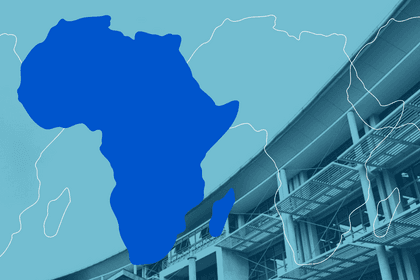
Genomics has endless potential, if everyone is included
Investment in increasing diversity in genomic datasets will benefit global health and scientific progress. Hear from director of Discovery Research, Michael Dunn, as he reflects on our latest report.

Wellcome
Our understanding of human health and disease is underpinned by the study of genomes. Genomes are made up of the DNA in each of our cells. But the genomes of individuals vary, and these differences show up across populations. Identifying these individual differences is key to understanding, diagnosing and treating disease.
However, we are missing key data to understand health and disease in particular regions and communities around the world.
There is a large lack of diversity in populations studied in genome research. This has severely compromised progress. Unless this situation changes, disparities in research and health outcomes will continue to grow.
The lack of diversity has resulted from:
- the selection of locations where research studies take place,
- the demographics of participants in studies, and
- the types of data collected.
We need to change how genomic data is collected and who it is collected from. This is explored in more detail in our report, Data and Diversity in Genomics.
This report explores whose genomes are being studied and what kind of data is being captured. It details the key challenges and opportunities for genomic research at different maturity levels.
Where are the gaps in genomic data?
Genomics projects and datasets are heavily skewed towards populations in higher income settings, mostly in the Global North. In these settings, large-scale research cohorts often don't reflect the full diversity of the population. Lower resourced-regions and minority groups are commonly under-represented.
There are also gaps in the kinds of data that are collected. Alongside genomic information, we often see gaps in socio-economic data. This means we often don’t have a clear picture of the lifestyles and broader social context of research participants.
What is causing a lack of diversity in genomic research?
The lack of data diversity reflects many inter-related challenges, which vary according to context. Core themes include:
Global research inequity
There is an imbalanced geographical distribution of research funding, infrastructure, and training. This reflects the political, cultural and historical forces that shape science and research. Genomics methods are expensive and often need to be deployed at scale to generate large datasets and achieve statistical power. This has resulted in genomic research being centred in particular countries and regions.
Lack of trust and engagement
In the same way that power imbalances shape the global research landscape, they also impact relationships between researchers and research participants.
There are still many communities that are under-represented, even in countries where there has been a lot of genomic research. Minoritised groups are particularly affected.
This can stem from a lack of trust, owing to a history of colonialism or exploitation. It can also result from lack of engagement, collaboration and dialogue between researchers and broader stakeholders, including research participants and affected communities.
This is a complex area with many challenges. The report goes into more detail to unpack the issues faced by different regions and communities.
How can we improve diversity in genomic research?
Progress requires both targeted and systemic change.
We need to encourage and invest in:
- funding to grow the field – including enhanced training, infrastructure and research capabilities in lower resourced settings
- early and extensive engagement and dialogue – with study participants, communities and stakeholders to integrate their perspectives and priorities
- suitable tools and resources for analysing and sharing diverse data
Researchers need to consider how they’re designing their studies. They should think about what samples they need for their research, who is involved and what 'representative' means.
It's important to support and expand research leadership around the world. This is especially needed in areas where genomic data is scarce. We need to support equitable partnerships so that global collaborations can flourish.
All of this requires trust between researchers and the communities they engage.
What’s Wellcome doing?
We have supported the growth of the genomics field at pivotal moments over the last 30 years. We have invested in new programmes, technologies and resources to open the field and strengthen the community. These include:
- The Human Genome Project
- Wellcome Sanger Institute
- Wellcome Case Control Consortium
- Human, Heredity and Health in Africa (H3A)
- Global Alliance for Genomics and Health
- Human Cell Atlas
- UKBiobank
Population-scale studies are a powerful way to understand and disentangle the complexity of the many factors impacting health and disease. They are an incredibly valuable resource for genomics research. Our approach to supporting large-scale longitudinal population studies has recently evolved to take a more global perspective. This is in line with many of the recommendations from our report. We want to contribute to, and advocate for, a landscape of cohorts that are representative of the global population.
We support the Coalition for the Establishment of the African Population Cohorts Consortium, which seeks to enable transformative leaps in our understanding of health and wellbeing. Research leaders are building the initiative to harness the unparalleled diversity of population level data across Africa.
We support a wide array of researchers around the world to generate new insights into life, health and wellbeing. This includes investigators and teams who are generating genomic data from more diverse populations and settings, such as South Asia Biobank, DepGenAfrica and East London Genes & Health.
This year, we ran a series of workshops to discuss the ethical, legal and social contexts of genomics research. The workshops brought together people across a range of fields and research locations. We will be publishing our findings soon.
And most recently, we announced our support for the African Bioinformatics Institute (ABI). The ABI aims to lead and coordinate the bioinformatics field on the African continent by developing sustainable research infrastructure and supporting training, analysis and collaboration.
What's next for Wellcome and genomics?
Wellcome is a major funder, but we are only one player in the global landscape. This report is a call to action for the wider community to pay attention to data diversity when designing experiments and studies. It is also for other funders, research and health organisations to reflect on how best to support diverse and representative research studies.
We join our voice with the many who are already advocating for change and driving it forward.
We are committed to equity in how and where we fund, both through our open mode and targeted investments.
We will continue to explore ways to support an equitable genomic future. This isn’t just about equity. It’s bad science not to explore the full breadth of diversity presented by the global population.


